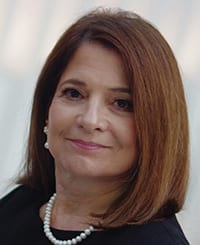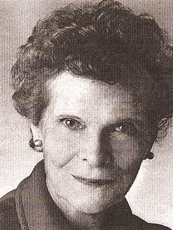
[Editor’s Note: With PRNEWS celebrating its 75th anniversary this year, we thought it fitting to dedicate a story to the founder of the publication you are reading, an extraordinary woman named Denny Griswold. The author is another special lady, Shelley Spector, co-founder of the Museum of Public Relations. We trust you will find this an inspiring and enlightening story, though one tinged with sadness and a bit of déjà vu. The sadness derives from the end of Griswold’s life. The déjà vu comes from the fact that women in PR today face some of the same issues they confronted at the time Griswold started this publication, 75 years ago.]

She was called the “grande dame” of the industry and the “queen of PR.” Her rival, Jack O’Dwyer, said she was the “closest thing we have to a celebrity in this field.” She gave the industry its first newsletter, Public Relations News, in 1944, its first organization of women in 1946 and its first PR handbook for business people two years after that.
Most important, she gave the PR field a sense of professionalism, and helped fuel its spectacular growth over the second half of the 20th century.
That she did so in a field that had maybe a half-dozen female professionals at the time of the founding of this newsletter is a testament to her talent, tenacity and verve.
Early Life
Born Denora Prager in New York in 1908, she went by “Denny” her whole life. This confused many readers who thought she was a man. She thought this was both a curse and a blessing. Being considered a male may well have given the newsletter more credibility, she said.
In fact, at the time of PRNEWS’ founding, women leaders were so few and far between, that when she held the first meeting for Women Executives in PR (WEPR), she could barely find enough females to fit around her Upper East Side dining table.
The Spotlight
Griswold was a celebrity in an industry that discouraged its practitioners from seeking the limelight. But by staying in the limelight, indeed, by creating the limelight in the first place, she gave the field the glow it so desperately needed as it struggled to be recognized as a bona fide profession in the 1940s, 20 years after it formally came into being.
She would frequently throw black tie affairs at the Waldorf. But unlike today, these galas were not for PR people, but for CEOs. As the New York Times reported in 1965, the 20th anniversary of PR News attracted the CEOs of Texaco, Western Union, the American Petroleum Company, Air France and dozens of others. We know from reports that Ford’s Lee Iacocca attended at least one party, as did Chief Justice Warren Burger.
“Powerful men always wanted to stay on her good side,” Muriel Fox, who worked as Carl Byoir’s first female executive in the 1950s, said recently. “Reputations could rise or fall with Denny. The way she wrote about you in her newsletter—or even if she wrote about you at all—was critical.”
Despite her ability to throw an elaborate party, Griswold was deadly serious about her cherished PR field, which was just coming into full swing in the 1940s.

100 PR Firms
When she started PR News with husband Glenn Grisworld, there were 100 PR firms and one dozen in-house PR departments. The field was growing fast, though.
“World War II labor shortages gave a number of women the opportunity to enter the field, “ Dr. Karen Miller Russell, an associate professor at the University of Georgia’s Grady College said in a recent interview. “What’s amazing about Denny Griswold is that she retained her position as a leader in the field for decades through PR News. She obviously identified a significant need and then filled it. Because of her, PR News contributed to the growing professionalization of public relations.”
An Idea for a Newsletter
It was July 1944 at 3 a.m. that Denny had the idea to start the newsletter. As she told the Times years later, she woke up husband Glenn, then the publisher of Businessweek, and told him about her idea. “Start taking notes,” she instructed him. He agreed it was such a good idea that he quit Businessweek to work alongside her.
While PR News was born just as the field was coming into its own, the newsletter not only chronicled the growth of the PR field, it would also fuel that expansion. The weekly case studies would showcase PR solving real business problems. In addition, the field by that time was employing enough practitioners that their comings and goings made for interesting reading.
Founding WEPR
In 1946, Griswold founded the aforementioned Women Executives in PR, the first such organization of its kind. Diana Kalman, then a PR director for Monsanto, and founder of the Women Executives in Public Relations Foundation, in a recent interview, emphasized Griswold’s championing of women in the field. Even though she initially found just five women in the profession to join WEPR, she envisioned the organization could be an advocate for women to join the field.
“Founding Women in PR showed what a true visionary Denny was,” Kalman said. “She knew that while there may not have been many women in the field back then, this would one day change, and women would need one another to change it.”
Gertrude Bailey, an original WEPR member and a manager of PR for Monsanto, recalled in 1973 the paucity of women in the field when Griswold started the organization. “Denny was asked to make up a list of women executives” to join WEPR and “a few were all she she could find.”
Tenacious Recruiter
Bailey recalled Griswold’s tenacity. “Whenever we couldn’t agree on whether we were going to have a lunch or evening meeting Denny would enter the fray. She would remind the ladies, “We have a definite job to perform, to further the professional interest of every woman in public relations. We have to give a little bit more. Surely it is not too much to give one evening a month!”
By 1955 there were 23 members. “Today (1973), we have more than 100 members representing 85 firms including 29 corporations,” Bailey said.
Over the next 45 years, as the agencies started attracting more women, Griswold chronicled their rise to leadership roles, honored them at events and continued to champion the success of women in PR.
A Sad Ending
Beginning in the 1990s people stopped seeing Griswold at industry events. Some said she was living alone in her townhouse, with little family around. O’Dwyer wrote that she had been moved to a nursing home in the mid 1990s.
And then O’Dwyer reported: “Griswold, the former Denora Prager, was held incommunicado at the Wilton Meadows nursing home for the last 5.5 years of her life. Her death at 92 on Feb. 7, 2001, was discovered by this reporter who tried to reach her on the phone. Her many friends should have gone to the police.”
The Times was more diplomatic. It reported her Feb. 7 passing weeks later, on March 24, saying the “founder and former editor of the newsletter Public Relations News,” died in Norwalk, Conn. “She was 92 and in recent years had lived at the Wilton Meadows Health Care Center in Wilton, Conn.”
Unseen Since 1995
Several weeks after her death, under the headline, “Griswold Not Reachable Since 1995,” O’Dwyer reported that “numerous friends and family” had attempted to contact Griswold since 1995, but were unsuccessful. Several PR pros had ventured to the nursing home in Wilton, CT, over the years in an effort to connect with her. They were turned away. Phone messages to Griswold at the nursing home also went unreturned.
In that article O’Dwyer noted a three-person team from PRSA, including Harold Burson, met with Griswold several times. The talks involved turning her four-story NY townhouse at 127 E. 80th St into a communications museum and a training center. A contract stipulated that Griswold would continue to live in the house for the rest of her life, O’Dwyer reported.
Sudden Disappearance
During the course of those talks Griswold suddenly “disappeared,”a member of the team told O’Dwyer. Its members were never was able to regain contact with her. Her townhouse subsequently was sold, reportedly for $3.2 million.
“It is not known what happened to the antiques or all of the papers connected with PR News, which Griswold edited for nearly 50 years,” O’Dwyer reported. Indeed, my search for early editions of PRNEWS for this article have been to no avail.
By the time of her death, Griswold had received 134 awards and honors for community and PR activities.
Editor’s Postscript: The author has a special connection to Denny Griswold, who once gave her a ‘Proud to be in PR’ pin, which is on display at the Museum of Public Relations.
During this 75th anniversary year, replicas of the pin are among the items PRNEWS will be distributing during its many events and a September celebration of the milestone.
As Shelley tells us, “Denny’s success in PR helped her and hundreds of women in the 90s pave the way for them to start PR firms.” Spector should know. She started a firm in 1991 that she continues to run. “Denny didn’t just publish a newsletter,” Spector says. “Denny gave women the license to think that nothing was impossible anymore.”
CONTACT: [email protected]
